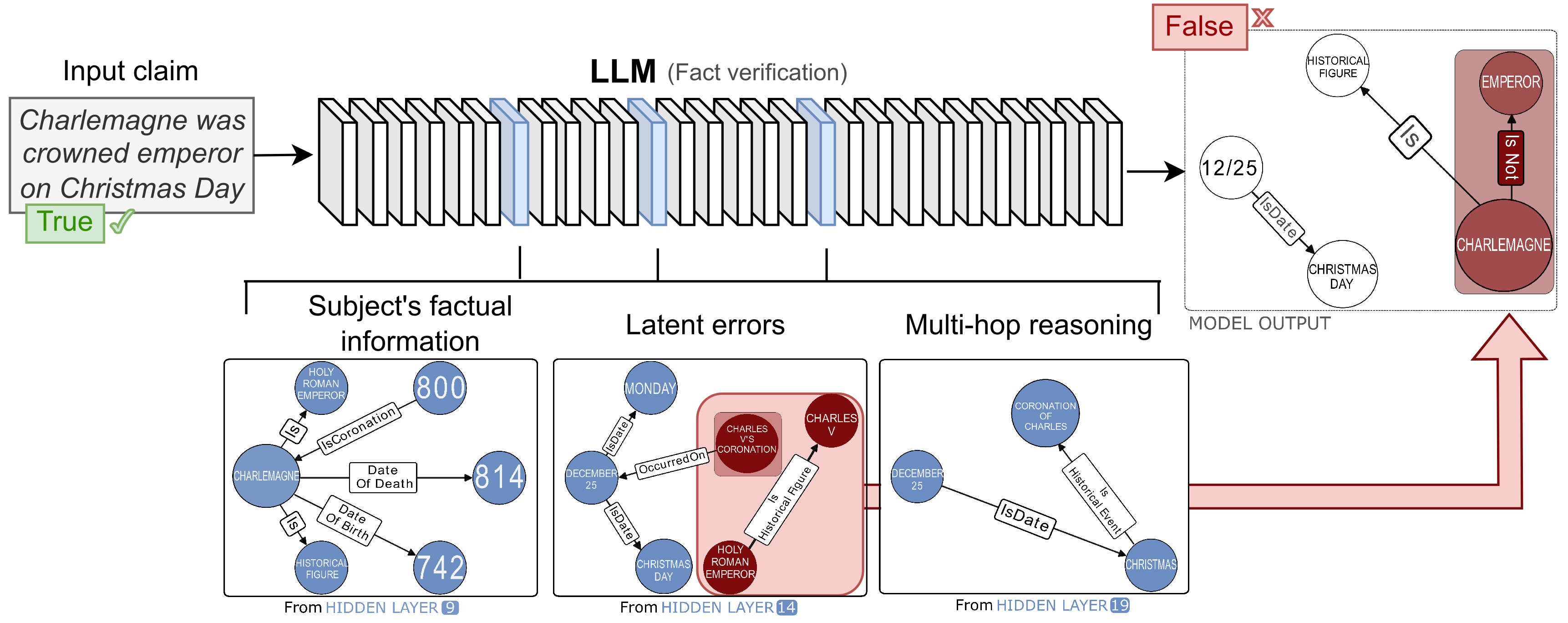A Python library based on the technique of activation patching to represent the factual knowledge encoded in the latent space of large language models as dynamic knowledge graphs.
Project description
Latent-Explorer is the Python implementation of the framework proposed in the paper Unveiling LLMs: The Evolution of Latent Representations in a Dynamic Knowledge Graph to appear in the 1st Conference of Language Modeling (COLM).
Overview
This framework decodes factual knowledge embedded in token representations from a vector space into a set of ground predicates, exhibiting its layer-wise evolution through a dynamic knowledge graph. It employs separate model inferences, with the technique of activation patching, to interpret the semantics embedded within the latent representations of the original inference. This framework can be employed to study the vector space of LLMs to address several research questions, including: (i) which factual knowledge LLMs use in claim verification, (ii) how this knowledge evolves throughout the model's inference, and (iii) whether any distinctive patterns exist in this evolution.
Installation
Use the package manager pip to install the Python package
pip install latent-explorer
or download the repository and install the package with
pip install -e .
Demo
The folder tutorial includes a script showcasing the pipeline tutorial/script.py
Usage
Import the package
import latent_explorer
Initialize the application with the LLM and the inputs
explorer = latent_explorer.LatentExplorer(
model_name = "meta-llama/llama-2-7b-chat-hf",
inputs = ["The capital of France is Paris"]
)
Prepare the textual prompts
explorer.generate_prompts(verbose = True)
Perform the inference and get the hidden states
explorer.inference(parse_output = True, output_hidden_states = True)
Probe each hidden states
results = explorer.probe_hidden_states()
Save the textual results
latent_explorer.utils.save_results(results, folder_path = "outputs")
Generate the dynamic knowledge graphs
tg = latent_explorer.TempoGrapher(results)
Get the graphs
graphs = tg.get_graphs()
Generate and save the graphical figures
tg.save_graphs(folder_path = "outputs")
Language models available
This package inherits all of the LLMs supported by the LitGPT package. This framework works with instruction-tuned language models, such as those named with the suffixes "inst", "instruct", or "chat".
models = latent_explorer.utils.all_supported_models()
Computational resources
Since this framework performs multiple language model inferences, using a GPU is recommended (see CUDA). This framework has been tested with using two GPU-based configurations: (1x) NVIDIA® A100-40GB, and (4x) NVIDIA® T4 Tensor Core - 16GB.
Contributing
Pull requests are welcome. For major changes, please open an issue first to discuss what you would like to change.
Acknowledgements
This implementation is powered by LitGPT, conceptualised, designed and developed by Marco Bronzini. This work has been funded by Ipazia S.p.A.
Citation
If you use this package or its code in your research, please cite the following work:
@misc{bronzini2024unveiling,
title = {Unveiling LLMs: The Evolution of Latent Representations in a Dynamic Knowledge Graph},
author = {Marco Bronzini and Carlo Nicolini and Bruno Lepri and Jacopo Staiano and Andrea Passerini},
year = {2024},
eprint = {2404.03623},
archivePrefix = {arXiv},
primaryClass = {cs.CL},
url = {https://arxiv.org/abs/2404.03623}
}
License
This work is licensed under a Creative Commons Attribution-NonCommercial-ShareAlike 4.0 International License.
Project details
Download files
Download the file for your platform. If you're not sure which to choose, learn more about installing packages.
Source Distribution
Built Distribution
File details
Details for the file latent_explorer-0.1.3.tar.gz.
File metadata
- Download URL: latent_explorer-0.1.3.tar.gz
- Upload date:
- Size: 2.0 MB
- Tags: Source
- Uploaded using Trusted Publishing? No
- Uploaded via: twine/5.1.1 CPython/3.12.4
File hashes
| Algorithm | Hash digest | |
|---|---|---|
| SHA256 | 9be00c999b0f02f5ffbe8d117d6536cdf66a1b7caed200ffaad39c43027bb26f |
|
| MD5 | 0ac95e48daefe3d6dbb621c349f8b24c |
|
| BLAKE2b-256 | f0e04c45b0230684b52fb140fbdf943715648392eecd676f11c6a75f14ccb635 |
File details
Details for the file latent_explorer-0.1.3-py3-none-any.whl.
File metadata
- Download URL: latent_explorer-0.1.3-py3-none-any.whl
- Upload date:
- Size: 34.8 kB
- Tags: Python 3
- Uploaded using Trusted Publishing? No
- Uploaded via: twine/5.1.1 CPython/3.12.4
File hashes
| Algorithm | Hash digest | |
|---|---|---|
| SHA256 | 91d4387791a79c0093d5a9aebb7785bd7c31a546c890425362a9d6d9748aa306 |
|
| MD5 | 3c5eaf864344c916eb4e6dda7940eef2 |
|
| BLAKE2b-256 | 90cd545bc8ff2c7b0af94d8ce50c2cf7ebb1b8e2dddaa80a96b8b08d959cacb2 |




















